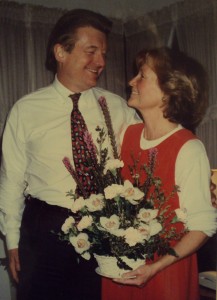Although Nate always dreamed of having the freedom for extensive travel, I’ve always been happiest at home. When the two of us would go away, he couldn’t squeeze in enough sight-seeing, but walking back through our own front door was always the highlight for me.
Now, however, I have grandbabies. Although I’m getting “up there” in years and going away offers its inconveniences, spending time with these little ones has brought a new dimension to travel. Today Jack and I are on the road, headed south to meet up with two year old Skylar, one year old Micah, their parents, others of my children and all of my sister’s family. We’ve rented a couple of condos in the Florida Gulf.
My travel buddy, Jack, rides like royalty sprawled out on the back seat as we clock our 1425 miles together, visiting friends along the way. Our mostly-empty vehicle reminds me of many a crowded car trip with children jockeying for their fair share of space. Without the benefit of seat belts or car seats in the early years, personal boundaries were loosey-goosey and hard to define.
Just like every family, we always over-packed, pulling out of the driveway loaded to the ceiling. Then car-top carriers were invented, and we bought a tan plastic model from Sears that could have doubled as a giant McDonald’s burger box. It didn’t do much for the wind-flow around our station wagon but held seven full-size suitcases. Although it was a beast to load and unload, it cut down on passenger over-crowding and, by that, on parental insanity.
Driving from Chicago to Florida in March is to travel through three seasons in two days. But when northerners glimpse that first palm tree, it’s like walking out of a blizzard and into a botanical garden show. Winter ends and flip-flop season begins.
One of our many family drives to Florida was particularly memorable. We’d purchased our first mini-van and were excited to break it in together. The car-top burger-box was old and worn by this time but still worked well. As usual, it was crammed full of both soft and hard suitcases.
Half way to Florida we were gassing up and buying candy bars when I noticed a sign for a $2 sit-in-the-car wash. Since we’d started our journey on Chicago’s snowy, salty roads, the new van looked old, and none of us liked that. So as Nate walked into the gas station to pay, I said, “We’re gonna go through the car wash!”
Forgetting all about our carrier, the kids and I sat up straight while the automatic treads pulled us into the tunnel. Massive brushes and thick carpet strips quickly smothered us in bubbles.
Suddenly there was a tug on the van, followed by a mysterious racket behind us as the carrier straps snapped and the car wash brushes knocked our box off. Because of all the suds, though, we were oblivious.
At the end of the wash, our clean van sat sparkling in the sun just in time for Nate to see it as he came from the mini-mart holding a coffee in each hand. I was smiling, but he was not. “What happened to the carrier?” he said, looking at our rooftop.
[…to be continued]
“Don’t begin until you count the cost.” (Luke 14:28)






